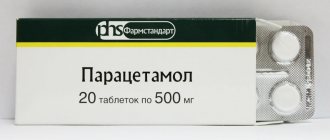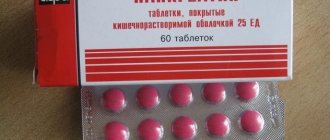Nursing mothers may have problems with their intestines after the birth of their baby (increased gas production, discomfort, heaviness, intestinal disorders). This is due to a large amount of the hormone progesterone, which reduces the tone of smooth muscles. There is no need to endure these symptoms, because there is a drug called Mezim, which is used for indigestion. Pancreatin, which is part of it, has a beneficial effect on the gastrointestinal tract.
However, the use of Mezim during breastfeeding is very controversial. Let us consider in detail the information about this drug and the purpose of this drug during lactation.
Basic information about the drug
Mezim is a drug that is used for pancreatic enzyme deficiency. The medication is used to treat digestive disorders that are associated with a lack of enzymes. Thanks to it, the activity of the pancreas is restored and digestion improves.
The dosage form of the drug is pink-coated tablets that dissolve in the intestines. The medication consists of pancreatic enzymes: amylase, lipase and protease. Thanks to them, proteins, fats and carbohydrates are digested faster, and as a result, they are absorbed faster in the small intestine.
Additional substances:
- pyrogenic silicon dioxide;
- stearic acid;
- titanium dioxide;
- microscopic cellulose;
- milk lactose;
- crospovidone;
- 2-methylpropenoic acid;
- acrylic acid ethyl ester;
- simethicone;
- food additive E1505 and E122;
- carmellose sodium;
- Twin 80;
- talc.
The enzyme preparation guarantees a hydrolytic, proteolytic effect. Thanks to trypsin, which is included in the composition, the medication anesthetizes and suppresses the increased secretion of chemical compounds by the pancreas.
The tablet takes effect half an hour after administration; it bypasses the stomach and dissolves in the intestines.
Mezim can be taken for the following diseases:
- chronic inflammation of the pancreas;
- cystic fibrosis;
- bloating;
- diarrhea;
- intestinal infectious diseases;
- inflammatory and dystrophic diseases of the digestive tract after radiation therapy or surgery to remove most of the stomach;
- Digestive disorders due to poor nutrition.
The drug is taken for discomfort after eating, after eating difficult to digest food. Using an enzyme agent, the gastrointestinal tract is prepared for radiological and ultrasound examinations. Mezim is taken by people who experience bloating, diarrhea and abdominal discomfort in the absence of diseases of the digestive tract.
Mezim can be taken while breastfeeding only after a doctor's prescription.
Composition and indications
Mezim is produced in the form of dragees, covered with a film that dissolves in the intestines.
The drug contains the enzymes pancreatin lipase, amylase and protease. It is these substances that are produced in the body by the pancreas and are responsible for the breakdown of fats, proteins and starch in the intestines. In addition to enzymes, the drug contains excipients. Mezim is recommended for the following diseases:
- Pancreatitis
- Cystic fibrosis
- Chronic inflammatory diseases of the gastrointestinal tract
- Postoperative period after surgery or radiation therapy of the gastrointestinal tract
- Poor nutrition
- Before examining the gastrointestinal tract
Dosage
Depending on age, Mezim can be taken in the following dosage:
- patients under 13 years of age - about 1500 IU of lipase per kg of total weight;
- from 13 to 19 years – about 20,000 IU of lipase per 1 kg of total weight;
- adult patients - from 1 to 3 tablets three times in 24 hours.
The enzyme is taken orally during or immediately after meals. Do not chew the tablet, but swallow it. You can drink the drug with warm water without gas. To ensure that the medicine is better absorbed, take the tablets while standing or sitting, and remain in a vertical position for at least 5 minutes after taking it. Otherwise, the drug will be destroyed before it enters the stomach.
When treating with Mezim and several other drugs, an interval of 10–15 minutes should be maintained.
The duration of the therapeutic course depends on the severity of the disease. For example, with chronic inflammation of the pancreas, treatment can take several years or even a lifetime.
The dosage of the drug during breastfeeding is prescribed individually for each case.
mezim with gv
Please help me figure it out.
My son is 5.5 months old. Completely on GW. Caesarean section due to weak labor.
He was born to me on a large scale, Weight 4060, Height 53 cm. In the orphanage, he was fed formula for all 6 days and
applied to the breast, after the maternity hospital I fed milk all the time.
On the 2nd day after the maternity hospital, he began to sleep poorly and toss and turn in his sleep.
We have replaced 5 pediatricians, we want to find someone who will really find the cause and help in treating the child.
I’ll tell you a little about my son: since the maternity hospital, our mouth has been constantly open and our nose is wheezing, it also constantly seems to be puffing or breathing quickly (everyone says that the child’s lungs are normal), he had sweating sickness for 2 weeks,
My son’s tummy was constantly gurgling and gurgling - he was prescribed bifidumbacterin and lactobacterin + subsimplex.
It helped for 2-3 weeks. Then it stopped giving, I immediately felt bad, I started giving it again and it didn’t help.
Around 3-4 weeks, the skin on my face began to peel off and seborrheic crusts developed, and I began to spit up a lot, they said. Put on a diet
helped a little. No antihistamines were prescribed. They prescribed to smear Gistan and a decoction
bay leaf to smear the face, take scatology, check for carbohydrates and dysbacteriosis. Poop turned green by 1 month
thin and smelly, from 1 month constant restlessness (up to a month periodically poor sleep and screams) and poor
I did not sleep for 9-10 hours, terrible gas and pain in the abdomen, by the 3rd month it became better, but the cheeks were not
have improved. By 2 months all tests were completed. They said it was a terrible dysbacteriosis and prescribed Furazalidone (it obviously got better),
then bacteriophage polyvalent, enterosgel, primadophilus. On the bacteriophage we were so bombarded that it became terrifying!!!
Our whole body: arms, stomach, back, face and scabs have become larger, although before the phage my son’s body was better.
Crusts and rashes were only on the face. But we called the doctor, she said that we need to give enterosgel
until the toxins are removed, and then continue the phage again, they did so, but it got even worse: the skin became inelastic,
with wrinkles, the whole body was covered with red spots and the face and legs began to get wet longer, crusts formed.
became We completed the course to the end and began to drink primadophilus and after 7 days the baby began to sleep and communicate. I think it's here
It was a coincidence that the enzymatic system had partially matured and therefore I felt better.
The crusts began to disappear, leaving dry, non-red lesions on the face. After the phage, the skin became faded
with wrinkles, weeping lesions on the face, legs, and now on the arm. Even after primadophilus he began to poop himself
1 per day. The poop was gummy and greenish. According to the tests they said enzymatic deficiency and
secondary infection after the phage, give enterol 0.5 drops. morning and evening 14 days and another 7 days
1/4 drops, 1/8 drops of lactase enzyme at each feeding, 1/4 tablet of mezim 4 times a day, Creon or Microzyme (now
drink), normoflorins 1 tsp. morning and evening, calcium glycerophosphate 1/4 tablets, vitamin D3 Vigantol 1 drop
every day until summer, on the face: clotrimazole + fucidin and skin cap for 7 days, where there are yellow crusts, after only
skin cap 7 days. At the beginning of the treatment, it was about 4.5 months, we began to see teeth, but I continued the treatment, child
I began to sleep poorly, gas and rumbling in the stomach began again as before 3 months, teeth came out but the anxiety remained,
It was difficult to go to the toilet, the stool became viscous, but still greenish with lumps and mucus, the face after this mixture
after 2 days it became generally ideal, and then slowly it began to sprinkle again, with periodicity first
redness and pimples, then crusts and peeling. Around the age of 2 months, my joints began to crackle, and I was prescribed calcium.
The diet was after 1 month: everything was possible except dairy products, it became a little better, but not completely.
I only eat turkey meat, I don’t eat eggs, cereals: buckwheat, rice, oatmeal, oatmeal, potatoes, carcass. onions, cabbage, zucchini, eggplant, pods. beans, lettuce, broccoli and flowers. cabbage, sometimes carrots and beets, lean and maria cookies, sunflower and pumpkin seeds, non-rafted sunflower oil, Jerusalem artichoke syrup and fiber, stevia leaf, green compote. seven apples, dried apricots and prunes. Until a month ago, I didn’t know that I couldn’t eat squid, caviar, tomatoes, or fish; I ate it. On my side of the family: my dad has psoriasis, my sister has polynoses and pishch. allergies and I have food. allergy + contact. dermatitis. What would you recommend doing? Test for allergens? Which? I feel very sorry for my son, I can’t understand what exactly is wrong with him, we feel like we have a food allergy, allergic rhinitis (he wheezes through his nose, now it’s better and started sneezing often), he coughs only when he wants to poop and fart, his mouth is constantly open, maybe swelling of the mucous membrane due to allergies, so the mouth is constantly open, fermenopathy: immature pancreas and lactase deficiency. I don’t even know who to turn to for help, because I’ve already changed 5 pediatricians, but I’ve never been to an allergist.
Sorry that it’s so much and chaotic, I’m just already in despair, my son doesn’t sleep, he stopped talking 3 weeks ago, he’s constantly whining oo-oo-oo-oo, he’s talking and that’s it, he’s not eating well, he’s nervous, he’s stopped pooping himself. 3 at a time and only by rocking in a stroller or on a fitball... Skin cap helps, but not immediately, after a while. I want to find the reason, please help me figure it out!!!!!!!!!!!!!!!!!!!
PS Lately, for about 3 weeks, my hands are constantly in my mouth, either scratching or scratching. The drool is constantly flowing. (2 teeth have already come out at 4.5 months, so far there are no more signs.
Contraindications and side effects
There are several contraindications for the enzyme preparation:
- individual intolerance to the components of the drug;
- acute inflammation of the pancreas;
- chronic inflammatory process in the pancreas in the acute phase.
The drug can be taken during pregnancy and breastfeeding after a doctor's prescription and only in the absence of chronic inflammation of the pancreas.
In some cases, the patient feels sick, has bouts of vomiting, and has pain in the stomach. Rarely, anaphylaxis, urticaria, angioedema, and chronic allergic dermatitis occur. Some patients complain of defecation disorders.
Long-term use or increased dosage threatens to increase the concentration of uric acid in the bloodstream. In case of overdose in patients with cystic fibrosis, stenosis of the colon or ileocecal region occurs, and this threatens intestinal obstruction.
When should Mezim be stopped?
You should stop using the drug in the following cases:
- a woman has increased sensitivity to the components that are included in the composition;
- pancreatitis, which is chronic;
- acute condition of pancreatitis.
The medicine may also cause the following side effects:
- severe nausea that progresses to vomiting;
- abnormal stool;
- severe pain in the stomach area.
The medicine may make the woman's condition worse
Mezim during lactation
Can a nursing mother take Mezim? There is no clear answer to this question, since there is no information about studies on this group of patients. In addition to pancreatic enzymes, the drug contains additional substances that do not harm a nursing mother and her baby. Based on this, Mezim can be taken during breastfeeding as needed.
There is no information on the complete safety of the components of the drug. The enzyme product is sold at every pharmacy and is dispensed without a doctor's prescription. Most mothers who have tested the drug on themselves claim that it is safe. However, the body's reaction may be different and this should be remembered.
Many doctors allow the use of Mezim during breastfeeding, since the components of the drug do not penetrate into the blood and are not excreted in milk.
Rules for taking Mezim that a nursing mother must follow:
- Before taking the drug, consult a gastroenterologist.
- Take Mezim immediately after feeding your newborn. It is recommended to first express the milk that you will feed your baby.
- If the child wants to eat after taking the pill, then feed him expressed milk. Then the nursing mother should express milk until relief appears in the breast. For information on how to do this, read the article at the link https://vskormi.ru/breast-problems/zastoi-moloka-y-kormyashei-mami/.
- Do not feed your baby for 3 hours after taking the pill.
- A nursing woman should listen to her feelings after taking the drug. If complications such as diarrhea or bloating occur, stop taking the drug and consult your doctor.
If you experience regular digestive disorders, even with proper nutrition, stop taking the drug and visit your doctor for an endoscopy and ultrasound examination.
Self-medication during breastfeeding is contraindicated! If you have symptoms of an eating disorder, visit a gastroenterologist, who, after diagnosis, will prescribe appropriate treatment.
Mezim is an effective remedy for improving digestion. The main substance in this enzyme preparation is pancreatin. The instructions indicate that Mezim is not recommended during breastfeeding. However, breastfeeding consultants note that this medicine can be taken during lactation. The international directory e-lactancia.org states that the risk of use during breastfeeding is zero. In this article we will talk about side effects, indications and precautions.
Indications
Mezim forte is taken for problems with the digestive system that arise due to a lack of enzymes. You can drink it for the following diseases:
- chronic pancreatitis;
- inflammatory processes in the liver, gall bladder and gastrointestinal tract;
- after removal of part of the stomach;
- irradiation of the digestive organs, after which diarrhea or gas formation is observed;
- diet violation;
- eating too fatty foods;
- sedentary lifestyle;
- before performing an X-ray examination of the abdominal cavity.
Nursing mothers can take Mezim only after consulting a doctor, since this medicine can cause side effects not only in the woman, but also in the child.
Similar drugs
Disruption of the gastrointestinal tract occurs due to the production of a small volume of enzyme fluid. During lactation you can take Festal, Creon, Pancreatin and other drugs. It is important to get approval from your doctor first. Maalox and Almagel cannot be absorbed into breast milk.
For children under one year old, Sab Simpolex and Espumisan help cope with excessive gas formation. They optimize intestinal function and help remove gases from the body naturally. The dose is important, and only a specialist in the field can calculate it correctly.
The products help alleviate the mother’s condition and do not harm the baby.
Reception during lactation
Breastfeeding consultants indicate that nursing mothers can drink Mezim Forte. However, it is worth following some tips:
- The medication should be taken immediately after breastfeeding;
- Before the next feeding you need to express your foremilk;
- You can take the drug yourself only when needed. Only a doctor can prescribe the correct dosage and course of treatment;
- If the attending physician has prescribed Mezim Forte to a nursing mother, she should monitor her condition and the well-being of her baby. If you observe any negative reaction to the medicine, you should stop treatment and inform your doctor;
- You need to eat correctly during treatment with this drug. It is advisable to include pomegranate, black or “yesterday’s” bread, and rice in your diet.
As indicated in the instructions for use, Mezim Forte should be drunk during meals. The tablets are washed down with water in the required amount. Other drinks are not recommended. After taking the medicine, you should not lie down for five minutes, as it may not enter the stomach, but dissolve in the esophagus.
The dosage is determined depending on the state of health and age. A single dose is usually 1-2 tablets. Mezim forte can be taken only 10-15 minutes after other medications have been taken.
Interaction with other drugs
If a nursing mother is prescribed iron-containing medications, such as Ferrous Sulfate or Sorbifer, then you should not take them together with Mezim forte. This drug reduces the absorption of iron by the intestines, which can lead to anemia. In this case, patients may experience the following symptoms:
- weakness;
- brittle nails;
- pale skin;
- fatigue;
- cracks on the feet.
If a young mother experiences the listed symptoms, then it is worth stopping taking Mezim or replacing it with an analogue.
The effectiveness of Mezim decreases if taken together with antacid medications due to the calcium and magnesium content in them. In this case, you need to increase the dose of the enzyme drug.
What to replace it with?
Problems with the functioning of the digestive organs arise due to improper absorption process and insufficient production of enzymes. In addition to Mezim forte, a gastroenterologist can prescribe the following drugs to women who are breastfeeding:
- Vestal;
- Creon;
- Pancreatin;
- Penzital;
- Festal.
To reduce high acidity, nursing mothers can take Maalox, Almagel or Phosphalugel. These medications do not pass into the blood or breast milk, so they are safe for infants.
For severe gas formation, doctors recommend taking Sab Simplex or Espumisan. Their action is aimed at stimulating the intestines, which facilitates the release of accumulated gases.
The dosage and course of treatment with the drugs listed above can only be indicated by a specialist.
Which drugs are better?
In terms of price, it is more profitable to buy the drug Pancreatin. It is much cheaper than its analogues. As for effectiveness, you can compare Mezim Forte with other popular medicines.
Festal is produced on the basis of pancreatin, with the addition of hemicellulose and bile. It has the same therapeutic properties. However, it is worth noting that due to the presence of bile in its composition, taking Festal is prohibited for people suffering from gallstone disease.
Creon has almost the same composition of substances as Mezim. But the concentration of the main substance, pancreatin, is higher. In addition, Creon is available in the form of capsules filled with microspheres. This sets it apart from its analogue. So, these microparticles, entering the stomach, are evenly distributed there and contribute to a uniform digestion process.
The downside of Creon is the high content of active substances that can irritate the intestines. In addition, a large number of enzymes entering the body can cause the cessation of the production of its own enzymes. The high content of pancreatin contributes to the rapid and effective treatment of severe forms of gastrointestinal diseases. However, during breastfeeding, it is better to give preference to Mezim. Its composition has a more gentle effect, which is very important for the growing body of an infant.
5904 Latest discussions: Filter: AllOpenSolvedClosedWaiting for response OpenAlina asked 3 years ago 981 views.0 reply.0 vote. OpenSite visitor asked 3 years ago 763 views.1 answer.0 vote. OpenIndira asked 2 years ago 557 views.0 reply.0 vote.
Despite the fact that the main active component of Mezim Forte is pancreatin, a digestive enzyme, the drug is not recommended for use by nursing mothers, because studies on their effects on them have not been conducted (see Pancreatin for breastfeeding).
But practice shows that Mezim is the most gentle of enzyme preparations, and nursing mothers who took it did not notice a negative effect on milk and the baby.
Why might a doctor recommend taking Mezim?
All women know that during pregnancy a balanced diet is necessary so that vitamins and other elements reach the fetus. But after giving birth, many young mothers do not see the need for this. But this is one of the most common misconceptions. During the period of breastfeeding, it is especially important that a large amount of nutrients be supplied with the foods that are eaten. After all, it is necessary not only to feed the child, but also to maintain your own health.
Often women face problems with the gastrointestinal tract. This may be due not only to errors in the diet, but also to hormonal changes: the body sets itself another task - to produce enough milk to feed the baby.
While breastfeeding, it is forbidden to take medications without consulting a doctor.
Experts note that taking any medications without first consulting a doctor during breastfeeding is strictly prohibited. Therefore, if the following symptoms occur, it is recommended to consult a doctor:
- pain in the epigastric region and lower abdomen;
- feeling of heaviness in the stomach, especially after eating;
- nausea or vomiting;
- frequent belching with food or sour taste;
- heartburn;
- increased gas formation, bloating;
- digestive disorder manifested by constipation or diarrhea.
Do not neglect your health and self-medicate. The amount of absorption of vitamins and minerals that enter the body along with food depends on the proper functioning of the digestive organs. If a woman experiences problems with the gastrointestinal tract, there will be a lack of nutrients in the milk. And such a situation can be dangerous for the baby, because its full development, especially in the first six months of life, depends on breastfeeding.
Indications for use of Mezim
The doctor will conduct a full examination, take the necessary tests and, based on the results obtained, prescribe effective treatment. The drug Mezim replenishes the level of enzymes that the pancreas does not produce independently in the required quantities. The doctor prescribes pills for:
- excessive consumption of fried, fatty and spicy foods;
- chronic pancreatitis (only in remission) - inflammation of the pancreas, as a result of which the production of enzymes is significantly reduced;
- irritable bowel syndrome - inflammation of the mucous membrane, accompanied by diarrhea or constipation;
- flatulence - increased accumulation of gases in the intestines;
- Cystic fibrosis is a disease that is inherited. A woman experiences malfunctions in the functioning of many internal organs, including the pancreas;
- disruption of the pancreas due to chronic inflammation of the gallbladder and liver;
- dyspeptic disorder, manifested by nausea or vomiting.
According to the instructions, there is no sufficient clinical data on the effect of the active ingredients included in Mezim on the baby. You can take the tablets only after a doctor’s prescription, strictly observing the recommended dosage and period of use.
Video: what you need to know about pancreatitis
Recommendations
The best solution is a face-to-face consultation with a gastroenterologist, who should be notified about breastfeeding!
A special feature of this drug is its resistance to the effects of gastric juice - the capsules are covered with a special shell that protects enzymes from its effects, and therefore Mezim is more effective.
But women who are breastfeeding are advised to adhere to the following tips that will help protect the baby from possible undesirable consequences (remember: there are no clinical studies on the effects of the drug on infants):
- You should not prescribe a course of treatment yourself! The maximum you can afford is to alleviate the condition by taking a pill once;
- Before taking the baby, you should breastfeed, if possible, express a little milk (recommended);
- After taking the pill, you should refrain from feeding for 2-3 hours, and you should monitor your own condition for adverse reactions (diarrhea). If it appears, you should adjust your diet (recommended: rice, pomegranate, black bread or crackers);
- Before feeding, express a little foremilk, and it is advisable to empty your breasts until you feel relieved.
If you experience regular problems related to the functioning of the gastrointestinal tract (for example, disturbances in the processes of absorption and digestion), you should consult a doctor, because their treatment requires prolonged use of enzymes, which should be carried out exclusively under the supervision of a specialist!










